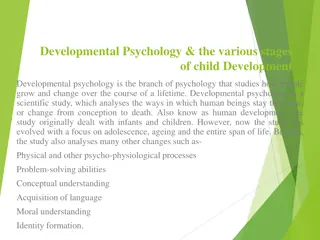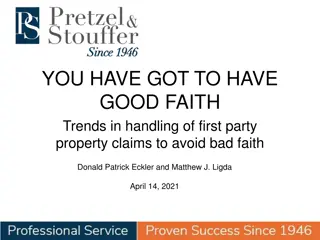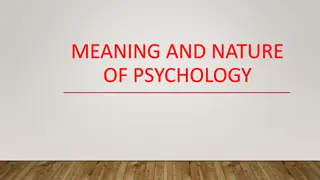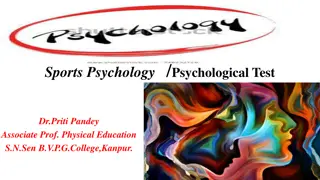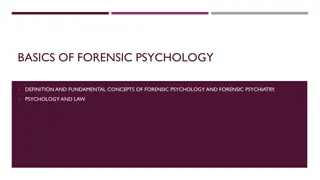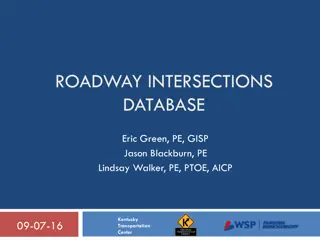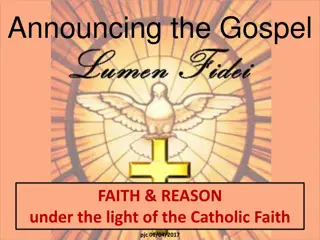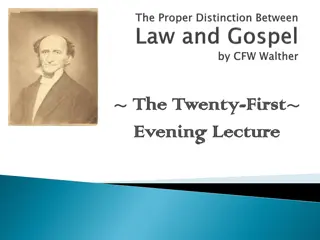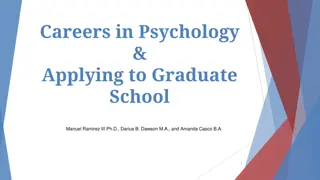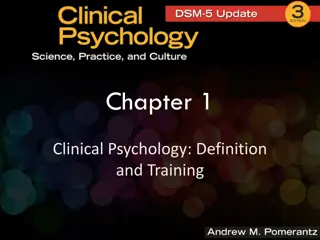The Intersection of Faith and Psychology: Exploring Complexities and Challenges
Exploring the intricate relationship between faith and psychology, this presentation delves into how these two realms interact, sometimes augmenting and other times undermining each other. Issues such as resurrection narratives and the impact of psychology on religious beliefs are discussed, highlighting the need for understanding and dialogue in this complex intersection.
Download Presentation

Please find below an Image/Link to download the presentation.
The content on the website is provided AS IS for your information and personal use only. It may not be sold, licensed, or shared on other websites without obtaining consent from the author. Download presentation by click this link. If you encounter any issues during the download, it is possible that the publisher has removed the file from their server.
E N D
Presentation Transcript
Name: Institutional Affiliation: Date:
Intersection of Faith and Psychology The juncture between the two is reconciling and edgy Social psychological processes inform about life and functioning Faith and psychology can augment and undermine each other Faith and psychology are naturally limitless topics The rationale of researching this topic is unravelling the intricacy involved
Connection Between psychology and Faith The point of the intellectual question in Judeo- Christian traditions remains unknown The new information has the likelihood of destabilizing existing beliefs, customs and doctrines safe opinions are easily embraced while contradicting views are usually ignored and denounced. This setting allow the newest psychology opinions to be engaged in spirituality and religion discussion
Continuation Psychology creates major issues to recognized faith Consider how issues related to resurrection has immense impact on people s faith The gospel narrations regarding resurrection are contradictory Distinct versions of who approached the tomb first and number of angels present Regardless of the differences, they provides the foundation for belief of resurrected Christ
Continuation Unlike other scientific study, Psychology provides diverse information on spirituality and religion Individuals encounter issues when tackling biology, physics, and anthropology topics Evolution models offer alternatives to renown opinions of divine creation Psychological theories evaluate how people think of spirituality and religion
Example From My Course My encounter of diverse stories regarding eyewitness stories Basing exonerations on unreliable identifications Most of the incarcerations are based on mistaken identity
Continuation People s interpretation of life depends on their faith or lack of it Peoples beliefs has been maintained in existing evaluation regarding spirituality People usually define religion based on what they consider sacred or holy Researchers key objective should be to learn more to gain transformation regarding general knowledge or beliefs
Psychological View Regarding Emotions Emotion is multifaceted experience leading to psychological and physical transformation that affects behavior and thought Human emotions entail conscious experience, expressive behaviors, and physiological arousal. Models of emotions include cognitive, neurological, and physiological. Physiological theory-body responses are accountable for emotions Cognitive theories- thoughts and mental operations are vital in formation of emotions Neurological models- operations within the brains results to emotional responses
Theories Involved James-Lange theory- assumes that emotions emanates from psychological arousal For example, feeling of fear will occur following physiological arousal Cannon-Bard theory-emotional experience and physiological arousal occurs concurrently and independently Facial-feedback theory proposes that facial expressions are related to experiencing emotions.
Continuation Emotions are straightforwardly connected to modifications in facial muscles. Schachter-singer model proposes that individuals reveal emotions depending in the physiological responses Cognitive appraisal model of emotion proposes that thinking takes place prior to emotions
Christian View Regarding Emotions Christian belief their beliefs regarding emotions are Christian due to teachings by churches or parents E valuation reveals the beliefs are distinct from biblical teaching. First men to be created had emotions Emotions helped man to appreciate God and develop a complete relationship with Him. Emotions offered motivational structure, offered intimate relationships and informed man
Application of the Model There are a lot of discrepancies in the model hence none of them should be trusted People should continue researching more about beliefs and psychology Research will inform more regarding God s creation, connection of beliefs and human psychology Human emotions are connected to beliefs and psychological responses Human thinking occurs first then emotions follows
Psychological view regarding personality Personality is features or blend of traits that makes people unique People are different depending on set of features Personality development depends on interaction and influence of nurture and nature Freud s model assumes personality includes unconscious processes, early childhood influences and instinctual drives. Personality development relies on the interaction of environment and instinct during early childhood
Continuation Psychosexual development assume all people are hedonistic Tripartite theory of personality assumes personality include superego, ego and the id. The id is the instinctive and primitive element of personality Trait approach to personality presumes that relatively stable traits determine behavior Eysenck s personality model assumes that people inherit a form of nervous arrangement that impact their personality
Continuation Eysenck-behavior represented by second-order personality features Personality relies on the poise between inhibition and excitation procedure of ANS Authoritarian personality presumes that people are likely to be prejudicial due to deep-rooted personality Allport s trait model assumes that personality is greatly determined at birth (biologically) them modeled by the surrounding.
Christian Views Regarding Personality Every person has unique personality People s actions, thought and feelings comes from the spirit, soul and body Personality is partly rooted in how spirit of man operates in the mind People are likely to compromise to have peace with others
Application of the Theory There are clear differences on the various models People should be open to new information regarding personality Research will provide adequate information regarding creation, personality and faith
Reflection of the Students Experience of the Course I have conducted various researches on eyewitness in legal sphere People are usually convicted due to mistaken identity People should not believe things at face-value, but rather conduct intense research.
Opinion Regarding Psychology and on my Future Career I believe there are diverse opinions and beliefs regarding creation. People should welcome and evaluate new information rather than believing at face-value People should evaluate and understand the connection between psychology and faith
Conclusion people should evaluate their association with their religious belief structures and faith. The one generated from authority figures and from various questions regarding the world The topic regarding the intersection between psychology and faith is a broad one There are tensions that prevail People should research about the tensions and identify discrepancy between beliefs and psychology
References John K. Rempel. (2011). Christianity and Psychology: Living at the Intersection of Faith and Intellectual Inquiry. direction journal, 40(1), 40-50. Retrieved from http://www.directionjournal.org/40/1/christianity-and- psychology-living-at.html Pythia Peay. (2014, January 17). At the Intersection of Psychology and Spirituality. Retrieved from https://www.psychologytoday.com/intl/blog/america-the- couch/201401/the-intersection-psychology-and-spirituality Rev. Kevin Grove, CSC. (2017, December 17). Where Do Theology and Cognitive Psychology Intersect? Retrieved from http://churchlife.nd.edu/2017/11/30/what-insights-can-the- neuroscience-of-memory-learn-from-the-catholic-mass/




